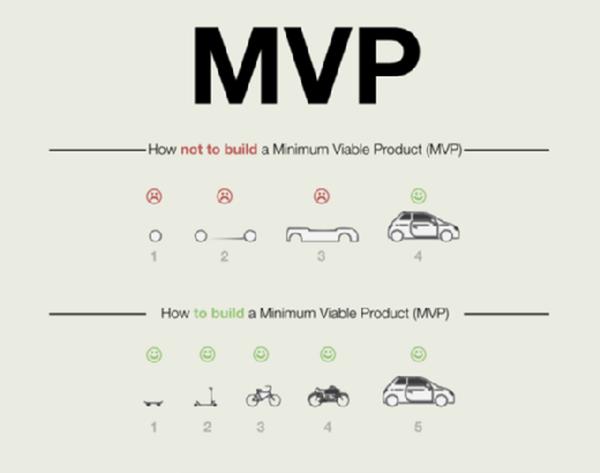

|
What is the best methodology when managing innovation projects?
|
|
Comparing Agile, waterfall Project Management and Scientific Methodology Dear Fellow Innovator,I have been challenged by a friend who asked me if I think Project Management methodology is applicable to manage “innovation projects”. My gut would answer “not at all”, but my brain knows that Project Management has its place in managing innovation projects. First let ‘s recap what “innovating” means: Innovating is the sum of a change + the adoption of the change. When we do innovate we create an utility, that (1) is a rupture with the past and (2) is adopted by others. The ways we innovate have been classified by Altshuller in his TRIZ theory in different degrees: • The first way is to adopt new solutions of more immaterial fields of sciences • The second way is finding something new: by chance, or through imagination. If we forgive “by chance” for the time being, “through imagination” means by stating an hypothesis (what if?) and finding a way to verify it. At the light of this classification, the type of methodology to be used to achieve the change an innovation promises, becomes much more clear. When to use Waterfall Project Management In the first class, the job of managing innovation resolves around: “adopting a solution”. In this case the classic Waterfall Project Management methodology is by far the most efficient. Waterfall Project Management is built around 3 steps: 1) Set the Deliverables 2) R2L planning 3) Manage execution Where R2L means “right to left”: from deliverables to components. Planning in the Project Management methodology is often about adjusting the closest previous experience to the actual project. We break each work into its structural components, clustering the work packages into phases that represents an intermediate product/system/result: can not fulfill the performances required by the Customer. At an intermediate phase of the project the components are not able to to perform the performances required by the customer, not even partially. E.g. at the end of the end of the Engineering Phase you will have all the details about the Gas Turbine your Customer ordered, but with them he is not able to deliver a single watt of power. The project is executed by controlling the Past, building scenarios about the Future and assuring to have a plan B in case the planned course of action fails. The level of uncertainty is very limited. The project is made to make adopt a solution that has been already seen elsewhere. When to use the Scientific Methodology (or Deming’s PDCA) If Project Management is perfect when adopting an innovation, the PDCA methodology shall be used when innovation is the result of something that still has to be “invented” or discovered. The Scientific Methodology is built around 3 steps: 1) Set Hypothesis 2) Iteratively shrink the uncertainty space 3) Manage adoption The key of the first step is the ability to state the right question “What If?” If the right question is properly stated, based on observations, then we can design the experiments that can confirm or reject our initial hypothesis, reducing the space of our ignorance. To do so we shall manage a set of iterations designed to progressively shrink the un-certainty space and converge around a solution. When the innovative solution is found, we can deliver a “general rule” based on logical steps, mathematical functions or probabilistic scenarios. When to use Agile Methodology When the Deliverable is stated but there is not an adjustable previous experience, we shall use the Agile methodology. The Agile methodology is built around 3 steps: 1) set Goals 2) Iteratively expand solution’s functionality 3) Manage adoption In Agile methodology you do not set deliverables (e.g. a fully functioning software ) but you set the goals that should be achieved by the deliverables. In this way the solution (or if you want: the innovation) can be defined as something capable in each iteration to deliver that goals. In the Agile Methodology each iteration ( or “sprint” in Scrum) is devoted to expand the solution capability, reducing the delta between the desired Goals and the achieved Goals. Each Iteration’s result , shall be delivered to the adopter to gather a feedback on the ability to satisfy the desired goals. In this sense the iteration is an hypothesis to be verified by the adopter. This approach has been adopted by Lean Startup and called MVP development. The figure here below should help understand it. (“borrowed” on a linkedin post…)
|
|
Little nightly thoughts by Business Exploration® |
|
Our Newsletter reaches 2200 professionals in 47 nations, with the ambition to offer alternative points of view and a relax break to our readers. |

|
This approach has two distinctive advantages: 1) in each phase of the project, the Customer is able to execute his/her “job-to-be-done”, ( in the above example: move faster from point A to point B ), even if the way the solution deliver its performance is sub-optimal. 2) In case the Customer has specific requirements to add or need to change its original job-to-be-done (e.g.: specifying that he will need to move from point A to point B because he has to deliver a Pizza), this approach allows to make adjustments without make the project collapse. Conclusion: Project Management is to be used when innovation is about adopting a known solution, while Scientific Methodology is an converging iterative approach to reduce the un-known and identify a solution. Agile is an hybrid, to be used when the final solution is stated by means of its goals and converging iterations are used to build it. There is a key difference between Waterfall Project Management and Agile: in waterfall project management each phase delivers an un-finished solution. In Agile, each phase delivers a functioning solution.
Hope this helps, Flavio
Note: This article has been written in collaboration with my friend Michael Forni, Scrum Master and Agile expert. In case you need help to implement Agile methodologies and frameworks in your organization do not hesitate to get in contact with Michael here
|

|
Business Exploration®
Milano: +39 02 8719 8498 Firenze: +39 349 648 2225 London: +44 7491 164 097
Info@business-exploration.com
P.Iva: IT 05998900483 © 2017 - tutti i diritti: riservati
|
|
Ci trovi presso:
c/o IF-Milano - Coworking space - via Torre, 29 - 20143 - Milano via 8 marzo, 22 - 50051 - Castelfiorentino - Tuscany - Italy 16 Perham Road - W14 9ST - London - UK
Scopri la nostra promozione “works for credits - 1st project free” ”
|
|
English |
